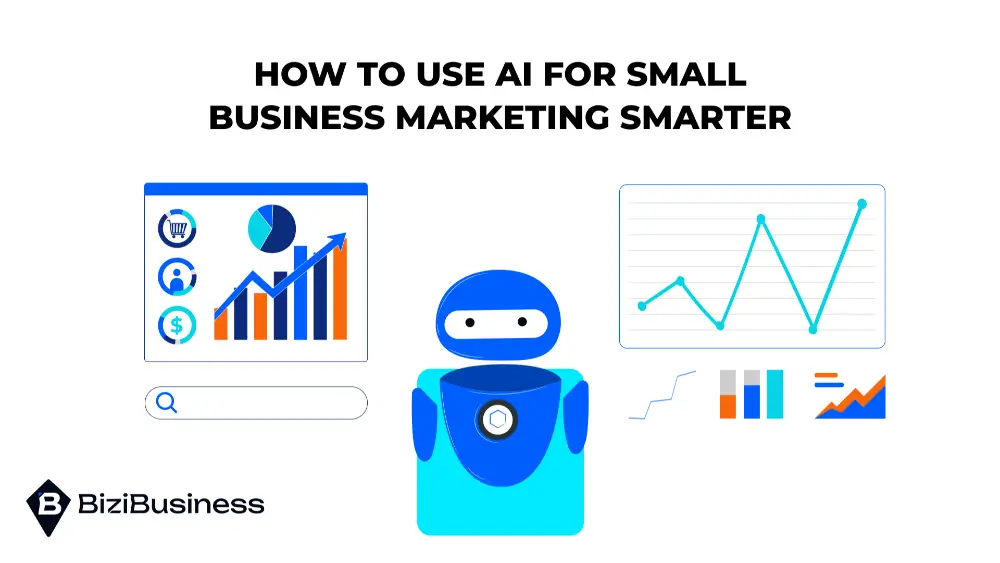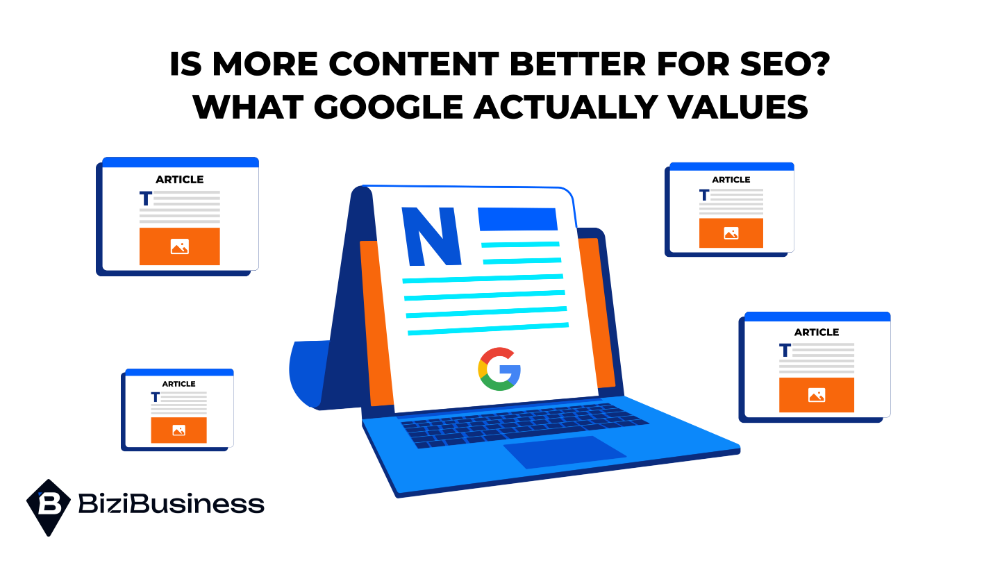Contents
Learn how to use AI for small business marketing to automate tasks, create better content, and reach more customers.
Running a small business shouldn’t mean thinking small — especially when AI is rewriting the rules of marketing. From solo founders to lean marketing teams, AI is now the secret weapon helping businesses punch above their weight. If you’ve ever wondered how to use AI for small business marketing without needing a tech degree, you’re in the right place.
In this guide, we’ll break down the real benefits of AI, spotlight smart tools built for small teams, and show you exactly how to turn automation into your competitive edge.
Why Small Businesses Are Turning to AI for Marketing

Ask any small business owner what holds them back from consistent marketing—and the answer is nearly always the same: not enough time, not enough budget, not enough people. Traditional strategies demand resources most small teams simply don’t have. But that’s where AI steps in.
Learning how to use AI to market my business isn’t about replacing your team; it’s about multiplying their impact. Whether it’s writing email copy in seconds, auto-scheduling social posts, or crunching campaign data on the fly, AI offers small businesses a smarter, more cost-effective way to grow.
And it’s not just a passing trend. We’re already seeing small businesses turn to AI tools to streamline tasks and unlock new revenue without adding overhead. Want to know if AI might eventually replace digital marketers altogether?
Check out our breakdown here: Can Digital Marketing Be Replaced by AI?
What AI Can Actually Do for Your Marketing
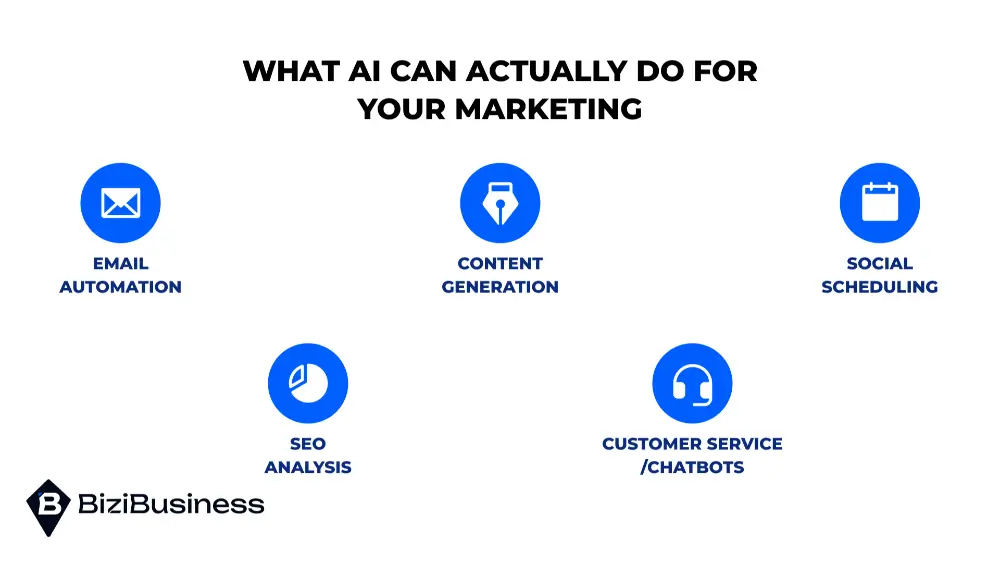
If you’re still wondering how to use AI for business marketing in a practical, day-to-day sense, the answer is: more than you think. AI isn’t just for tech giants—it’s built to empower small teams to do big things faster, smarter, and with less manual effort.
Here’s what today’s AI tools can actually take off your plate:
- Email Automation: From subject line optimization to full drip campaigns, AI tools can write, test, and schedule emails that convert—without you lifting a finger.
- Content Generation: Need a blog post, social caption, or product description? AI can draft it, personalize it, and get it ready for review in minutes.
- Social Scheduling: Tools like Buffer or Later, powered by AI, suggest optimal posting times, generate captions, and even recommend content based on trends.
- SEO Analysis: AI can now audit your site, track keyword performance, and suggest optimization tweaks that would normally require an SEO specialist.
- Customer Service/Chatbots: Smart bots don’t just answer FAQs—they engage visitors, collect leads, and escalate serious inquiries to your team in real time.
With the right setup, AI becomes your full-stack marketing assistant—minus the overhead. And for small businesses? That’s the competitive edge that levels the playing field.
Top Use Cases for AI in Small Business Marketing
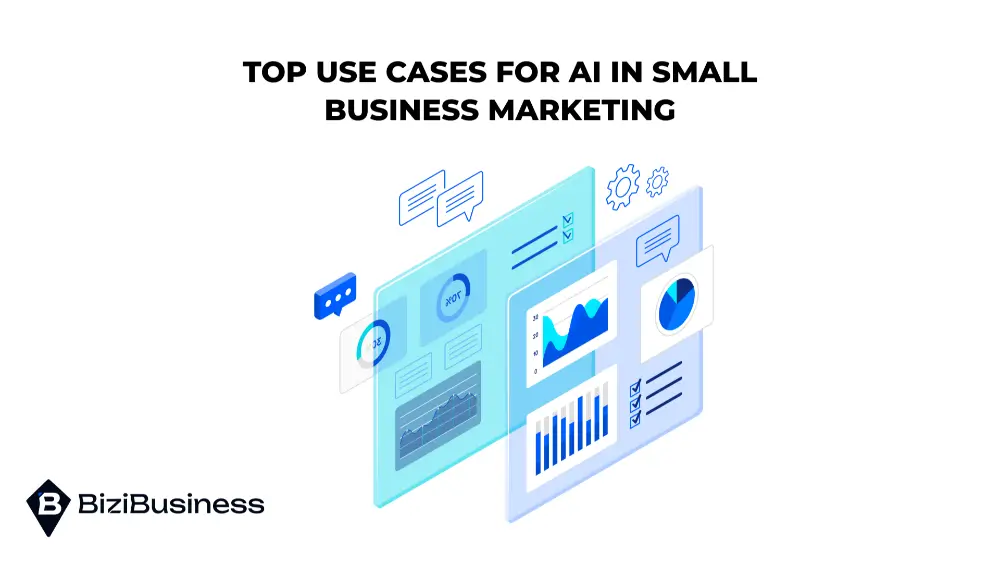
The promise of AI becomes real when you see how it transforms actual tasks. From content to customer experience, here’s where small businesses are using AI not just to save time—but to grow smarter.
AI-Powered Content Creation
Stuck staring at a blank page? AI tools can generate blog posts, craft compelling ad copy, and even write product descriptions that align with your brand tone. With the right prompts and fine-tuning, you’ll have content that’s both scalable and SEO-optimized. Want to see how AI stacks up in writing? Dive into our take on Auto-Generated Content.
SEO Optimization and Keyword Strategy
Gone are the days of guessing which keywords to rank for. AI now analyzes competitors, audits your site, and even suggests on-page improvements in real time. Platforms like SurferSEO and Clearscope make technical SEO accessible even for non-tech teams.
Explore deeper strategies in our guide: AI for SEO.
Personalized Email Campaigns and Lead Nurturing
AI-powered email platforms like Mailchimp and ActiveCampaign help you move beyond “batch and blast.” Think personalized subject lines, automated follow-ups, and intelligent segmentation.
Even ChatGPT can draft nurture sequences that feel genuinely human—because timely, relevant emails still drive the best ROI.
Social Media Scheduling and Engagement
Managing multiple channels with a small team? Let AI handle the posting while you focus on engaging. Tools like Buffer, SocialBee, and Lately.ai not only schedule your posts but also suggest what to say and when to say it—based on what’s trending and what works.
AI for Product Recommendations & Personalization
Want to upsell without being pushy? AI can analyze customer behavior to recommend the right products at the right time. From tailored landing pages to behavior-based email triggers, small businesses can now personalize like the big players.
Discover how it’s reshaping digital storefronts in AI in Ecommerce.
Best AI Tools for Small Business Marketers
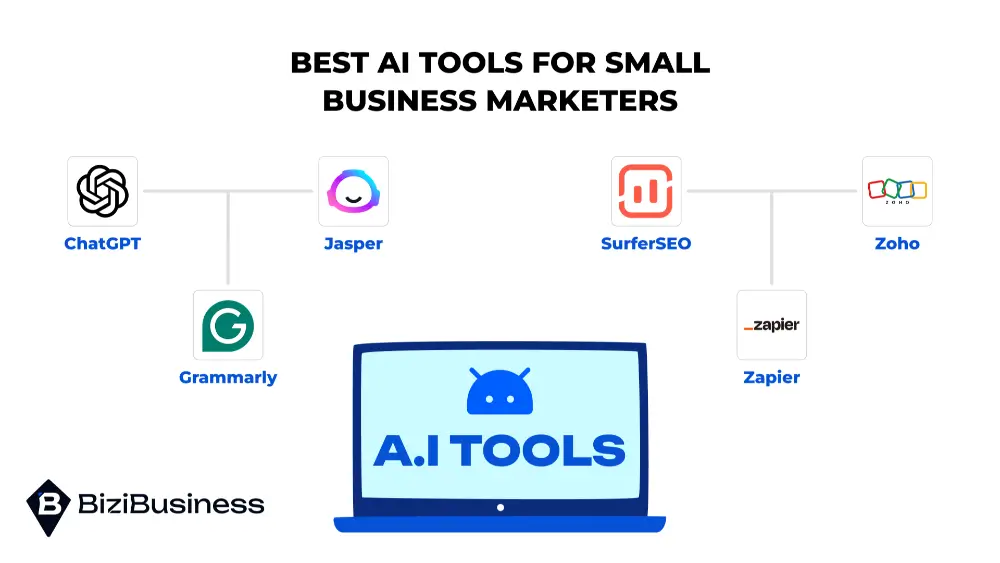
You don’t need a massive tech stack—or a massive budget—to take advantage of AI. The market is full of accessible, user-friendly AI marketing tools for small businesses that can help “solopreneurs” and lean teams automate, scale, and compete like pros.
Here are some of the best tools built for everyday marketers:
- ChatGPTWhether you need quick blog outlines, social captions, or even customer support scripts, ChatGPT delivers high-quality content with just a prompt. Great for idea generation and automating early drafts—no writing block required.
- Jasper.aiDesigned specifically for marketers, Jasper is ideal for crafting ad copy, emails, and website headlines. It offers tone customization and templates tailored to marketing use cases. Especially useful for content-heavy campaigns.
- GrammarlyDon’t let small grammar errors cost you credibility. Grammarly goes beyond basic spell check, helping polish tone, clarity, and flow. The AI writing assistant also offers suggestions for brand-consistent voice—perfect for fast-paced teams.
- SurferSEOPairing content with real-time SEO data, SurferSEO helps you rank while you write. It analyzes competitors and suggests how to structure your content for maximum visibility.
- Zoho + ZapierAutomation can feel complex, but tools like Zoho CRM and Zapier make it plug-and-play. Think lead follow-up emails, form responses, and calendar bookings—all handled without manual effort. This is where “solopreneurs” truly buy back time.
These tools aren’t just powerful—they’re affordable, with entry-level plans that make them accessible even to teams of one. The key is choosing the right combo for your goals, then letting automation do the heavy lifting.
How to Keep AI Marketing Human & Authentic
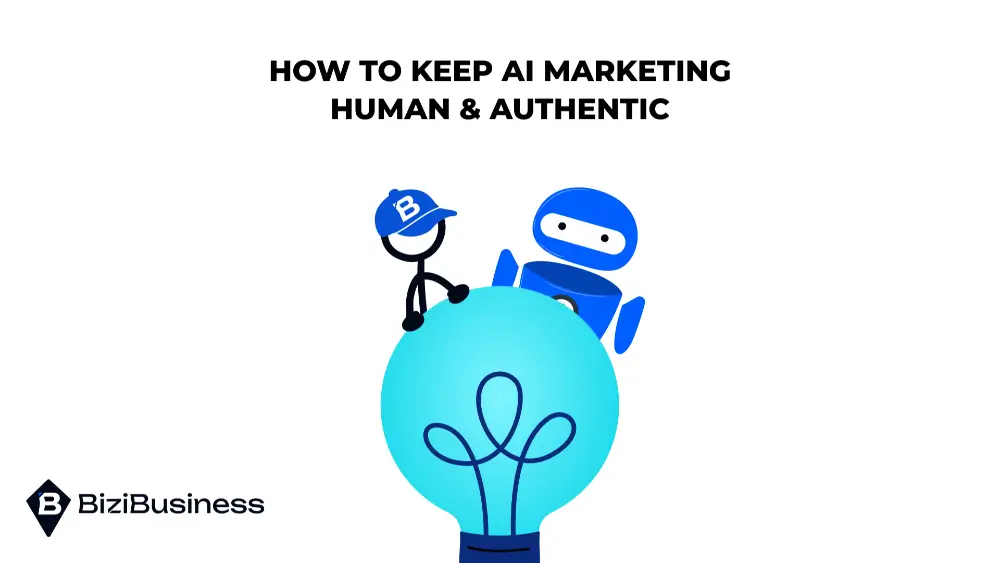
AI can help you move faster—but speed means little without connection. The best marketing still feels human, personal, and true to your brand. That’s why the smartest strategy isn’t replacing your voice—it’s amplifying it.
Start by using AI for structure and efficiency, but bring in your unique voice to shape the message. Use tools like ChatGPT or Jasper to draft, then refine the content so it sounds like you—not a robot. This balance is key to building trust, especially when creating foundational assets. If you’re developing long-term content plans, consider a cornerstone content strategy to ensure everything ladders back to your brand story.
At the end of the day, AI should free you up to be more human in your marketing—not less. Let it handle the heavy lifting, so you can focus on telling stories that truly resonate.
If you’re looking for hands-on help building content that ranks and resonates, BiziSEO is built to do just that—combining data-driven strategy with authentic, human-first messaging.
Common Mistakes to Avoid
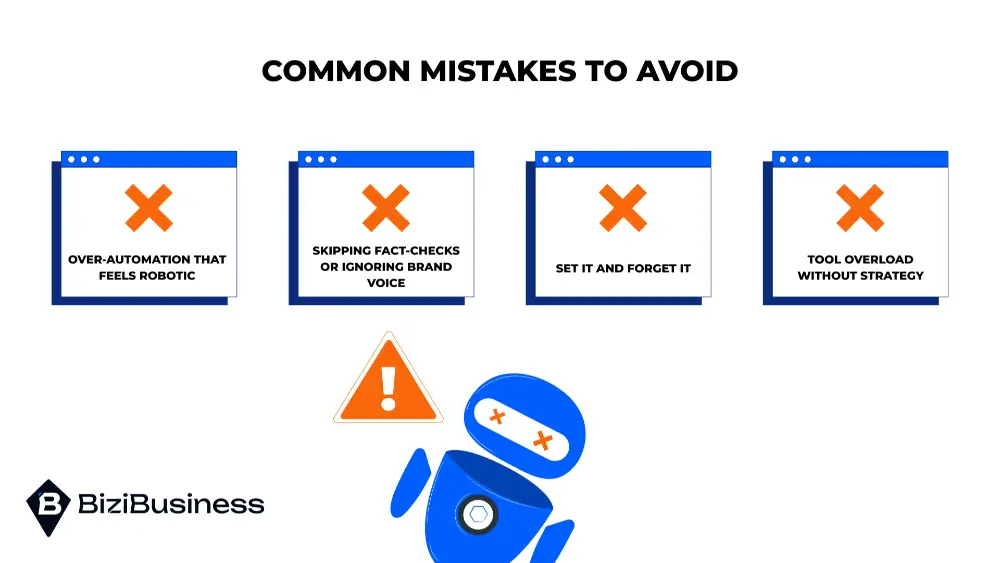
AI can be a powerful marketing ally—but only if used with intention. Without the right checks and balances, it’s easy to fall into traps that cost time, trust, and results. Here’s what small business marketers should watch out for:
- Over-Automation That Feels RoboticIt’s tempting to automate everything, but when every email or caption starts sounding like it was written by a machine, your audience will notice. Keep the human touch where it matters most—especially in brand storytelling and customer engagement.
- Skipping Fact-Checks or Ignoring Brand VoiceAI is smart, but it’s not infallible. Don’t assume every output is accurate or on-brand. Always review for tone, voice, and factual accuracy. Your brand’s credibility depends on it.
- Set It and Forget It AI can save time, but it still needs oversight. Regularly review how your AI-generated content performs. Are open rates improving? Is engagement holding steady? Performance data should guide how you tweak and evolve your strategy.
- Tool Overload Without StrategyToo many small businesses fall into the “shiny object” trap—subscribing to multiple AI tools without a clear plan or integration. Instead, focus on a tight stack that aligns with your goals and works well together.
When in doubt, simplify. Use AI to enhance, not replace, the marketing instincts that make your business unique.
Putting It All Together
AI isn’t here to replace your marketing—it’s here to amplify it. Think of it as your smart assistant: one that never sleeps, scales with you, and helps you get more done without burning out.
The key is using it with purpose. Focus on what actually moves the needle, review AI outputs through your brand lens, and stay flexible as the tech evolves. The businesses that win aren’t just the ones using AI—they’re the ones using it well.
Need a partner to help you do just that? Get personalized support from our SEO services or explore more small-business growth tips at BiziBusiness.
